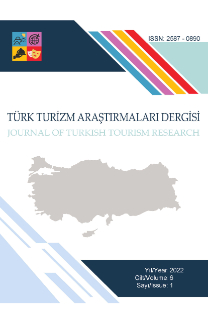TV Yemek Programlarının Gastronomi Eğitimine Yansımaları
Reflections of TV Cooking Programmes on Gastronomy Education
___
- Abbots, E., J. (2015). The Intimacies of Industry, Food, Culture & Society, 18(2): 223-243.
- Bonner, F. (2009). Early multi-platforming: television food programmes, cookbooks and other print spin-offs. Media History, 15(3): 345-358.
- Borda, D., Thomas, M. R., Langsrud, S., Rychli K., Jordan, K., Roest, J. and Nicolau, A. I. (2014). "Food safety practices in European TV cooking shows", British Food Journal, 116(10): 1652-1666.
- Boyle, R. and Kelly, L. (2010). The celebrity entrepreneur on television: profile, politics and power, Celebrity Studies, 1(3): 334-350.
- Caraher, M., Lange, T. and Dixon, P. (2000). The influence of TV and celebrity chefs on public attitudes and behavior among the English public, Journal for the Study of Food and Society, vol. 4, 27–46.
- Clifford, D., Anderson, J., Auld, G., and Champ, J. (2009). Good Grubbin': impact of a TV cooking show for college students living off campus. Journal of Nutrition Education and Behavior, 41(3): 194- 200.
- Collins, K. (2009). Watching What We Eat: The Evolution of Television Cooking Shows. New York: Continuum.
- De Backer, C., J., S. and Hudders, L. (2016). Look who's cooking. Investigating the relationship between watching educational and edutainment TV cooking shows, eating habits and everyday cooking practices among men and women in Belgium. Appetite, 96(2016): 494-501.
- De Solier, I. (2005). TV Dinners: Culinary Television, Education and Distinction Continuum: Journal of Media & Cultural Studies, 19(4): 465 - 481.
- Diehl, D. C., Pracht, D. W., Forthun, L.F. and Simonne, A. H. (2010). Food safety for 4-h youth: a survey of interests and educational methods, The Journal of Extension, 48(4): 1-11.
- Henderson, J. C. (2011). Celebrity chefs: expanding empires. British Food Journal, 113(5): 613-624.
- Howard, S., Adams, J., and White, M. (2012). Nutritional content of supermarket ready meals and recipes by television chefs in the United Kingdom. Cross sectional study. British Medical Journal, 345(e7607): 1-10.
- Lewis, T. and Huber, A. (2015). A Revolution in an Eggcup?, Food, Culture & Society, 18(2), 289- 307.
- Mathiasen, L.A., Chapman, B.J., Lacroix, B.J. and Powell, D. A. (2004). Spot the mistake: television cooking shows as a source of food safety information, Food Protection Trends, 24(5): 328-334.
- Matwick, K. and Matwick, K. (2014). Storytelling and synthetic personalization in television cooking shows, Journal of Pragmatics, 71(2014): 151-159.
- Pollanjuly, M. (2009). Out of the Kitchen, Onto the Couch. http://www.nytimes.com/2009/08/02/ magazine/02cooking-t.html?_r=0 (Erişim Tarihi: 28. 03. 2016).
- Pope, L., Latimer, L. and Wansink, B. (2015). Viewers vs. Doers. The relationship between watching food television and BMI. Appetite, 90(2015): 131–135.
- Razali, M. A., Tazijan, F. N., Rahim, S. A., Zulkifli,F. A., Isa, N. F. and Hemdi, M. A. (2012). Perfecting the Culinary Arts via the YouTube way. International Journal of e-Education, e-Business, e-Management and e-Learning, 2(3): 214-217.
- Rosemary, S., Stephanie, L. and Fisher, M. (2015). The influence of celebrity chefs on a student population, British Food Journal, 117(2): 614–628.
- Salkin, A. (2013). From Scratch: Inside the Food Network. G.P. Putnam's Sons.
- Steno, A., M. and Friche, N. (2015). Celebrity chefs and masculinities among male cookery trainees in vocational education, Journal of Vocational Education & Training, 67(1): 47-61.
- Taşpınar, O. ve Temeloğlu, E. (2018). Influence of Tv Cooking Shows on the Behavioral Intention of Participating in Gastronomic Tourism, Journal of Tourism and Gastronomy Studies 6(2): 24-40.
- Warburton, N. (2001). An opportunity lost, Environmental Health Journal, 109(4): 113-115.
- Yıldız, G. (2010). Muhasebe Mesleğinde Meslek Etiği ve Kayseri İl Merkezinde Bir Uygulama. Erciyes Üniversitesi İktisadi ve İdari Bilimler Fakültesi Dergisi, 156(36): 155-178.
- ISSN: 2587-0890
- Yayın Aralığı: 4
- Başlangıç: 2017
- Yayıncı: Prof. Dr. Yüksel ÖZTÜRK
Sercan YILDIZ, Meltem ÖZDEMİR, Ayşegül ACAR, ORHAN AKOVA
Fuar Katılımcılarının Destinasyon İmajı Algıları: Expo 2016 Antalya Örneği
Edip ÖRÜCÜ, Volkan AKGÜL, Canan ŞEKER
Çanakkale’de Alternatif Gastronomi Rotaları Belirlemeye Yönelik Bir Araştırma
Sezer KÖSELER, Berna KOÇHAN, Neciphan ATSIZ, Serdar SÜNNETÇİOĞLU
Turist Rehberleri Odalarının Sosyal Medya Kullanımı: Facebook Örneği
Turizmin Gelişmesinde Alternatif Turizm Pazarlamasının Önemi: Antalya Örneği
